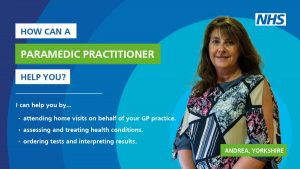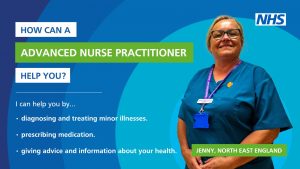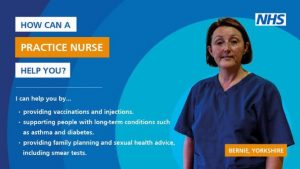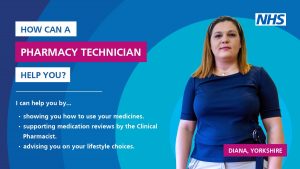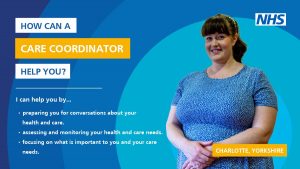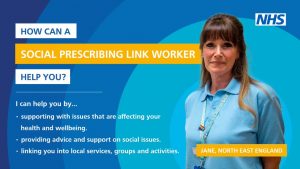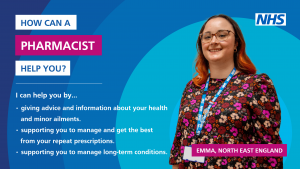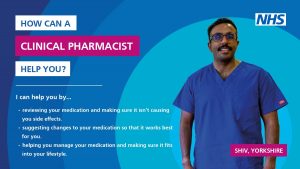Primary care services across the country provide the first point of contact in the healthcare system, acting as the ‘front door’ of the NHS. Primary care includes general practice, community pharmacy, dental, and optometry (eye health) services.
As part of General Practice, there are people working in a number of different roles alongside GPs that can all help you with your needs. Together they can get you the right care from the right healthcare professional as quickly as possible.
“Get the right care, from the right healthcare professional.”
Below we feature just some of the roles within your general practice team, who are here to help you.
Reception Team
| Receptionists are often the first person our patients see. They use customer service and admin skills to welcome people to a hospital, health centre, clinic or NHS headquarters. | |
|
How can a Receptionist can help you: – booking appointments with the right healthcare professionals – identifying services you can access with a referral – making appointments for new care or services you might not be aware of |
|
Paramedic
| Paramedic practitioners are trained to independently provide care that does not require the intervention of a doctor. They report directly back to the GP with the outcome of their visits and any updates on any treatment and medication that was given. The paramedics also work at the hubs during the weekends, triaging and seeing patients who did not require a GP to attend. | |
|
How can a Paramedic Practitioner help you? attending home visits on behalf of your GP practice. assessing and treating health conditions. ordering tests and interpreting results. |
|
Advanced Nurse Practitioner
| Advanced Nurse Practitioners are autonomous in making decisions based on assessment, diagnosis and interpretation of test results. ANPs are able to independently prescribe appropriate medication, and evaluate or refer to other specialists if necessary. | |
|
How can an Advanced Nurse Practitioner help you? – diagnosing and treating minor illnesses. – prescribing medication. – giving advice and information about your health. |
|
Physiotherapist
| Physiotherapists focus on identifying and maximising movement to improve the health and well-being of patients. They’ll work with people on a daily basis, recommending exercises and using high-tech ultrasound equipment or even hydrotherapy pools, depending on the patient’s needs. Once a patient’s movement problem has been diagnosed, they’ll work with them to determine a treatment plan. They’ll also promote good health and advise people on how to avoid injury. | |
|
How can a physiotherapist help you? – diagnosing and treating muscular and joint conditions. – advising on how to manage your condition. – referring you to specialist services. |
|
Practice Nurse
| General practice nurses work in GP surgeries as part of the primary healthcare team, which might include doctors, pharmacists and dietitians. | |
|
How can a Practice Nurse help you? – providing vaccinations and injections. – supporting people with long-term conditions such as asthma and diabetes. – providing family planning and sexual health advice, including smear tests. |
|
Pharmacy Technician
Care Coordinator
| Care coordinators provide extra time, capacity, and expertise to support patients in preparing for clinical conversations or in following up on discussions with primary care professionals. They work closely with the GPs and other primary care colleagues within the primary care network (PCN) to identify and manage a caseload of identified patients, making sure that appropriate support is made available to them and their carers (if appropriate), and ensuring that their changing needs are addressed. | |
|
How can a Care Coordinator help you? – preparing you for conversations about your health and care. – assessing and monitoring your health and care needs. – focusing on what is important to you and your care needs. |
|
Social Prescribing Link Worker
|
Social prescribing link workers connect people with local community activities and services that can help improve their health and well-being. (Social Prescribing Link Workers may also be referred to as Community Link Workers, Link Workers, Wellbeing Coordinators or Social Prescribers) A vital part of their role is to build relationships with the people they are helping by listening carefully to what’s important to them and what motivates them. | |
|
How can a Social Prescribing Link Worker help you? – supporting issues that are affecting your health and well-being. – providing advice and support on social issues. – linking you to local services, groups and activities. |
|
Pharmacist
| Pharmacists make a difference in the lives of their patients through expert knowledge of medicines and health. Helping people live longer and healthier lives depend on the safe use of medicines and excellent healthcare advice. Pharmacists’ unique expertise and knowledge make them essential members of the healthcare team. | |
|
Pharmacists can help you by: – giving advice and information about your health and minor ailments. – supporting you to manage and get the best from your repeat prescriptions. – supporting you to manage your long-term conditions. |
|
Clinical Pharmacist
| Clinical pharmacists are highly qualified experts in medicines and can help people in a range of ways. This includes carrying out structured medication reviews for patients with ongoing health problems and improving patient safety, outcomes and value through a person-centred approach. | |
|
How can a Pharmacist help you? – reviewing your medication and making sure it isn’t causing you side effects. – suggesting changes to your medication so that it works best for you. – helping you manage your medication and making sure it fits into your lifestyle. |
|

